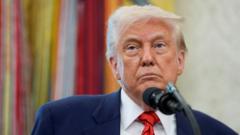As reactions continue to unfold, markets across Asia and Europe saw steep declines following President Trump's announcement of major new tariffs on a wide range of imported goods. These decisions, described by many as a pivotal shift in U.S. trade policy, have raised concerns about escalating tensions and economic repercussions globally.
**Global Markets Reeling from Trump’s Unprecedented Tariffs: A Reflection on International Relations and Trade Dynamics**

**Global Markets Reeling from Trump’s Unprecedented Tariffs: A Reflection on International Relations and Trade Dynamics**
A sweeping round of tariffs imposed by President Trump has left markets and international leaders scrambling to respond, with potential ramifications for global trade.
Investors were taken aback by the expansive scope of the tariffs, particularly the staggering 34 percent levy on Chinese products and notable increases for major trade partners like the EU, Japan, and India. As global economies brace for the potential fallout, leaders worldwide have voiced their condemnation and intentions to retaliate, with many warning that the move could lead to a broader trade war.
The response from various nations has been varied. China, in particular, characterized the tariffs as "unilateral bullying," vowing to enact countermeasures aimed at safeguarding its economic interests. The European Union has echoed this sentiment, with Commission President Ursula von der Leyen addressing the bloc's intention to formulate a collective response. Meanwhile, Japan's reaction has been more cautious, as Prime Minister Shigeru Ishiba highlighted his country's large investments in the U.S., opting for a diplomatic approach rather than aggressive retaliation.
Germany is among those feeling immediate pressure, with Finance Minister Jörg Kukies emphasizing the need for a robust EU response and warning that the tariffs could hinder the country's modest growth prospects. In stark contrast, the U.K. seems to be handling negotiations with the U.S. differently, with Prime Minister Keir Starmer indicating continued talks without immediate threats of retaliation.
Economic analysts predict that Trump's tariffs may significantly impact U.S. consumers by driving up prices, with some sectors poised for extensive contractions, particularly automakers and retailers facing steep new levies. The uncertainty surrounding trade agreements has also complicated the decisions for U.S. companies as they navigate tariffs that can shift with little warning.
Beyond the immediate financial implications, there are long-term considerations regarding the impact of these tariffs on developing nations and their pathways to economic recovery. Countries like Cambodia and Vietnam, reliant on exports to the U.S. market, are poised to face significant challenges as they absorb the shock of levies that could undermine their economies.
As the global economy continues to grapple with the consequences of these tariffs, the need for all parties to seek constructive dialogue and solutions appears ever more pressing. Continued tensions could lead to a reevaluation of trade dynamics and relationships moving forward. The question remains: how will nations respond to safeguard their interests while navigating this tumultuous economic landscape?
**Summary:** President Trump’s recent tariffs have triggered sharp declines in global markets and condemnation from international leaders. Countries including China, the EU, and Japan are formulating responses, with concerns over economic repercussions and trade wars rising. While the U.S. may face price increases, developing nations reliant on exports could suffer significantly from these measures, highlighting the broader implications for global trade dynamics.
The response from various nations has been varied. China, in particular, characterized the tariffs as "unilateral bullying," vowing to enact countermeasures aimed at safeguarding its economic interests. The European Union has echoed this sentiment, with Commission President Ursula von der Leyen addressing the bloc's intention to formulate a collective response. Meanwhile, Japan's reaction has been more cautious, as Prime Minister Shigeru Ishiba highlighted his country's large investments in the U.S., opting for a diplomatic approach rather than aggressive retaliation.
Germany is among those feeling immediate pressure, with Finance Minister Jörg Kukies emphasizing the need for a robust EU response and warning that the tariffs could hinder the country's modest growth prospects. In stark contrast, the U.K. seems to be handling negotiations with the U.S. differently, with Prime Minister Keir Starmer indicating continued talks without immediate threats of retaliation.
Economic analysts predict that Trump's tariffs may significantly impact U.S. consumers by driving up prices, with some sectors poised for extensive contractions, particularly automakers and retailers facing steep new levies. The uncertainty surrounding trade agreements has also complicated the decisions for U.S. companies as they navigate tariffs that can shift with little warning.
Beyond the immediate financial implications, there are long-term considerations regarding the impact of these tariffs on developing nations and their pathways to economic recovery. Countries like Cambodia and Vietnam, reliant on exports to the U.S. market, are poised to face significant challenges as they absorb the shock of levies that could undermine their economies.
As the global economy continues to grapple with the consequences of these tariffs, the need for all parties to seek constructive dialogue and solutions appears ever more pressing. Continued tensions could lead to a reevaluation of trade dynamics and relationships moving forward. The question remains: how will nations respond to safeguard their interests while navigating this tumultuous economic landscape?
**Summary:** President Trump’s recent tariffs have triggered sharp declines in global markets and condemnation from international leaders. Countries including China, the EU, and Japan are formulating responses, with concerns over economic repercussions and trade wars rising. While the U.S. may face price increases, developing nations reliant on exports could suffer significantly from these measures, highlighting the broader implications for global trade dynamics.




















